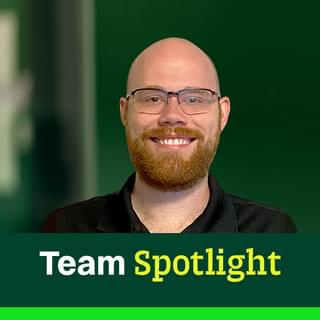Team Spotlight – Christopher Paschen

Let’s meet our new Research Practice Lead, Christopher Paschen. Christopher accrued over a decade of experience in the Information Security field in both the public and private sectors after earning B.A. and M.S. degrees from Dakota State University. At TrustedSec, he was promoted to his current role from Senior Security Consultant earlier this year, just before completing his fifth year here.
TrustedSec's research ensures that our consultants keep up with the ever-evolving cybersecurity landscape. As Research Practice Lead, Christopher manages the Research Team’s direction and contributes to internal implant and payload generation systems. Additionally, Christopher enjoys creating advanced tooling and platforms with features and capabilities not found in the commercial market that enable our Red Team to accomplish their goals. We asked Christopher a few questions about his time at TrustedSec and his career path.
Q: How have your past job experiences led you to your current role as the Research Practice Lead?
A: In my previous role, I managed incoming interns and helped them get up to speed developing and extending tooling. This experience allowed me to interact with several different personalities and it's where I started learning how to manage others.
Q: What are your goals and visions for your new leadership role as cybersecurity tactics, standards, and threats evolve?
A: My goal is to do my best to ensure that we effectively utilize the resources we have to advance capabilities for TrustedSec. Further, I want to ensure we are chasing down new and innovative research that matters and not simply following every industry trend.
Q: Can you give an example of how the Research Team benefits TrustedSec clients?
A: It is one thing to tell our clients novel tooling exists and that trusting a single security product may not be effective. It is another thing entirely to show where breakdowns occur when custom hacking tools are used by skilled consultants to bypass single points of failure.
The Research Team enables creating in-depth custom tooling that would go beyond the scope of what a customer-facing consultant may be able to do. As a specific example, we generate and maintain internally developed cross-platform implants that are not based on any other existing public tool chain. This allows us to perform testing on OSX and Linux targets and emulate an advanced adversary that knows how to do more than run shell commands.
Q: Why is research so important to what we do and how does it benefit the industry/infosec community as a whole?
A: It’s important to what we do because it allows us to more closely emulate a determined attacker. Adversaries are investing real time and money into finding new and innovative attacks to perform against companies. This means every attack will be different and sometimes may even be something that hasn’t been seen before. Having our own research allows us to provide that type of experience to our clients.
The infosec community also benefits when we decide to release some of that research so that defenders and other security practitioners can validate those attacks are protected against.
Q: Was there anything that surprised you about the culture when you started to work for TrustedSec?
A: No, but that is a good thing. TrustedSec conveys itself to be an employee-centric, positive employer and it has lived up to that reputation.
Q: What’s your favorite security meme?
